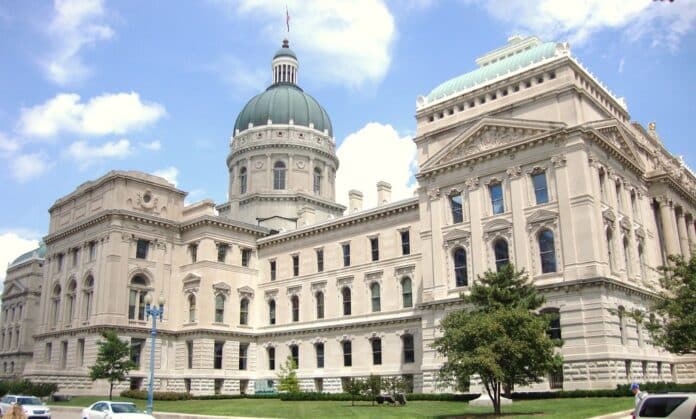INDIANAPOLIS — Gov. Eric Holcomb is beginning his second term with renewed promises to tackle the COVID-19 pandemic and help Indiana’s economy grow, and local lawmakers continue to be on board with his agenda.
Holcomb, a Republican who defeated both Democratic and Libertarian challengers to remain in office despite some controversy over his handling of the pandemic, delivered his State of the State address on Tuesday, Jan. 19. In his remarks — recorded for telecast instead of delivering them in person to a joint session of the legislature — Holcomb said the state’s fiscal responsibility has helped its economy remain relatively stable throughout a difficult year.
“Hoosiers have risen to meet these unprecedented challenges, realizing much more work is to be done in this historic moment of opportunity,” Holcomb said. “The state of our state is resilient and growing. Our foundation has held strong.”
Sen. Mike Crider, R-Greenfield, said he was happy with the governor’s remarks and is optimistic about Indiana’s future in the next year.
“It seemed like he hit all the important points,” Crider said. “…We’re kind of in an enviable position with the reserve funds that we had before all this started.”
Holcomb strove to cast the state as in the midst of a strong recovery, pointing to state government’s top-level AAA credit rating and some $2 billion in cash reserves as allowing more aggressive action than many other states.
Rep. Bob Cherry, R-Greenfield, said he thought the speech offered a unifying message while focusing on things the state government hopes to accomplish
“I don’t think it was a partisan speech,” Cherry said. “…I think we’ve done a lot of good things, but it’s not time to stop now.”
The governor announced several new policies in the speech, including a proposal to pay off $400 million of teacher pension debt, outstanding bonds on Interstate 69, and the mortgages of three state hospitals. Paying down the recurring expenses would allow the state legislature to craft a more flexible budget for the next two years, which it must do during the current legislative session.
He also announced the new Next Level Regional Recovery program, which will provide economic development funds to local communities focused on attracting and retaining jobs.
Other priorities for the year included continuing the state’s COVID-19 vaccination campaign, investing in providing broadband for the entire state, and ensuring K-12 schools receive full funding in the state budget.
Holcomb last week proposed a modest increase in school funding for the new state budget — 2% during the first year and 1% in the second year — while leaving for later discussions with legislators on taking up a report from a commission he appointed two years ago to recommend steps toward boosting the state’s lagging teacher pay.
“Our decisions, our discipline, now enable us to do things that many other states won’t be able to do for years to come,” Holcomb said. “For Indiana, the future is now, and the world continues to hear Indiana’s engines roar.”
Crider said he was pleased that Holcomb acknowledged health care and education as two of the biggest priorities for the coming year. He also praised Holcomb’s commitment to expanding broadband access –Holcomb has urged lawmakers to approve $100 million toward improving internet service in rural areas — and his endorsement of a policy that would prevent businesses and schools from being sued for COVID-19 damages in most cases.
Another program Crider was happy to hear mentioned was the Community Crossings grant program, which provides road and street funding to municipalities.
“That program has been hugely popular with local units of governments,” he said.
Cherry said the economic development Holcomb plans to do will be critical for the future of the state, especially on the issue of workforce development.
“We’re ahead of most states on the economy, but we need more people for the jobs we have in Indiana,” he said.
Rep. Chris Jeter, R-Fishers, whose district includes parts of northwestern Hancock County, also praised Holcomb’s speech.
Crider said he thinks Holcomb set a good tone for the next four years of state government.
“We’re trying to move things in a positive direction,” he said.
The Indiana Democratic Party, in a response to the speech, said it did not represent the reality of Indiana’s situation.
“Hoosiers tonight were told a story of an Indiana that just doesn’t exist in 2021,” chairman John Zody said in a press release. “While a vaccine is thankfully being distributed, a new, more contagious strain of COVID-19 is spreading, and Holcomb isn’t doing a thing to fight it. The governor intentionally broke last year’s promise to give public school teachers a much-needed pay raise. And, Holcomb refuses to acknowledge the fact more ‘good jobs’ have left Indiana than have come in.”
Democrats in the legislature faulted Holcomb and legislative Republicans for not taking more aggressive action on teacher pay, an issue that has festered since Republicans took full control of state government a decade ago.
“This is a third State of the State in a row that I’ve heard the governor make promises to Hoosier educators that an increase in pay is on the way,” said House Democratic leader Phil GiaQuinta of Fort Wayne. “I know Hoosier educators are tired of empty promises.”

